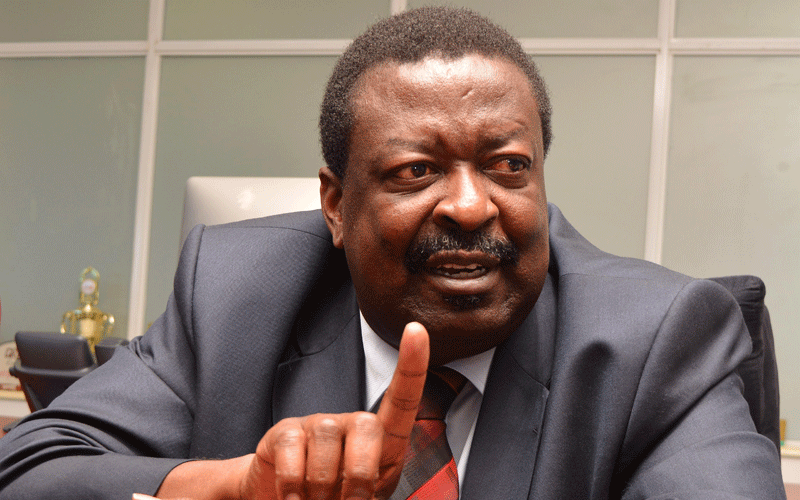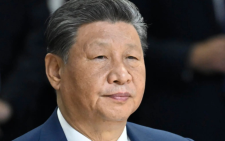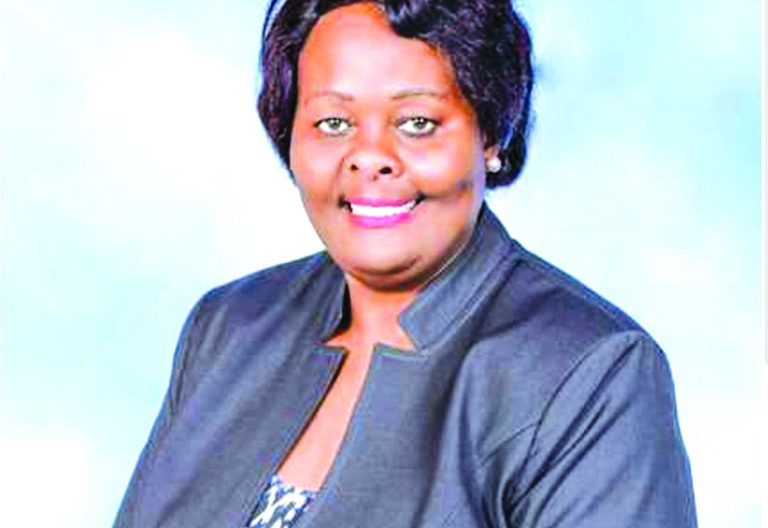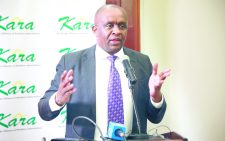Why debt, corruption pose biggest threat to Kenya

Kenya will have to seek debt rescheduling and fight corruption aggressively if it hopes to revitalise the economy ravaged by the Covid-19 pandemic. Amani National Congress (ANC) leader Musalia Mudavadi, sees the issue of debt as very urgent, and calls on the Treasury to form a special committee to address this with the country’s creditors. He spoke to People Daily’s Managing Editor Ken Bosire and Special Correspondent, Patrick Mwangi, in an interview on a wide range of issues. Excerpts:
Question: You have been here before as Finance Minister after the 1992 election that almost sunk the economy.
Given your experience then, and the myriad challenges facing the economy today, what concrete/remedial measures would you take to get the economy back on its feet and growth path?
Answer: Let’s do a recap. At that time, we were having a heavily indebted country. We have a parallel today as the country has a big debt.
In 1993, we had no goodwill from the international community, and there was a deliberate embargo from donors.
Right now, we have a difficult economic situation, but we are not facing an international embargo.
But Kenya is facing an international community that is equally ravaged by the Covid-19 pandemic, and this may impact on the international support for the country.
In 1993, we had no foreign exchange to talk about. Though we are heavily indebted, the foreign reserves are reasonable and substantial. But also note that the economy was smaller then, than it is today.
My first message would be that every effort must be put together to stabilise the frail economy.
This calls for political unity of purpose, and therefore, Parliament and the Executive must actively act in the public interest.
We need this because we must create an economy that works for Kenya, one that will generate jobs and expand the tax base.
I would instantly attack the debt crisis aggressively. I insist, Treasury needs to come up with a professional team of Kenyans who understand the nitty-gritty of debt management to quickly profile our debt, and at what cost it was borrowed.
This team must then sit with all our creditors urgently and have a roundtable because if we don’t, then defaults will start occurring.
Secondly, I would continue the fight against corruption. The fight against corruption seems to have gone slow.
A lot of the corruption issues; whether you are looking at the Arror and Kimwarer dams or Galana-Kulalu, there was a lot of hype (during investigations and arraignment).
Right now, you don’t hear of them at all. This is worrisome. The cold war that exists between the Judicial, Executive and prosecutorial arms must be dealt with. If this is not done, then the war against corruption may not be won.
We have problems now with the debt relief being offered by our key development partners.
Kenya is having difficulties with debt relief because it conflicts with clauses in the commercial loan agreements.
It seems like there was undue haste to sign up those loans because of the lax terms. This is the dilemma we are in right now.
Whether it is the Jubilee or next government, the country will have to go for rescheduling.
This is the elephant in the room. Rescheduling is a must. Our economy is ravaged right now, and 60 per cent of tax revenues are going to debt repayment, while recurrent expenditures consume what is left.
The only way to get relief is to urgently stop the haemorrhaging through debt.
Q: How big is the problem of the ballooning debt, both domestic and international, to the country’s economic growth, socio-political stability and future? What does this portend for a post-Jubilee administration?
A: Frankly speaking, the administration that comes in must have a very strong economic recovery agenda: Measures to generate jobs, and leverage on technology.
Debt is a big issue, economic sectors that have been battered by Covid-19 pandemic were already frayed anyway.
There is the need to refocus on the independence of institutions and get them to function, and proper focus to ensure that devolution works.
Q: As one of the Deputy Prime Ministers in the Grand Coalition Government, one of your assignments under your docket in the then Ministry of Local Government was to actualise the devolution dream.
But there is now a feeling that reluctant devolution politicians who favour centralised government have used the Covid-19 pandemic to further cripple county governments using resurgent national government officials that have never supported devolution. What in your view is the greatest threat to devolution?
A: First, are we committed to devolution or not? We see county governments that now look as if they are being strangled. They are being given functions but resources are not being given to support this.
Let us seriously implement devolution, honestly and in accordance with the Constitution. Counties are supposed to provide the new impetus for growth.
We are dealing with a government bureaucracy that has a history of centralisation. There are so many sleeper cells in the national government who have never liked devolution and continue to frustrate it.
Procurement is still largely controlled by the national government. Some functions like roads and health have been devolved, but the budgets of the line ministries are still growing. People want to claw back.
Of course, there are areas where county governments have let people down, but do we kill a good idea, or do we correct it?
Q: Growth fueled by huge debts is not working for Kenya. Why is it difficult for the Government to live within its means; budgeting for available tax revenues and releasing hundreds of billions from debt service to fund development programmes?
A: Wastage and corruption is the primary issue here. The International Monetary Fund gives assistance to balance of payments, but they take a keen interest in your economic management.
The World Bank gives development loans on some concessionary terms, but they will always insist on projects that are pro-people. This kind of scrutiny does not come with commercial lenders. The morality of how you use the money is none of their business.
In the Grand Coalition Government, there were challenges, but (retired President Mwai) Kibaki was quite firm. He would focus and say that monies of this kind must be put in projects where economic gains are highest.
The Jubilee government made excessive promises when campaigning for the Presidency- they promised stadia, dams etc. Basically, they wanted to do everything at once, and within the shortest time possible. This is why there was pressure to quickly borrow. Jubilee strategy seems to have been procurement driven, yet the purse was not big enough to accommodate that. The rest, of course, follows.
This is the syndrome that was picked up by the county governments. Governors who are now in trouble were in a similar rush.
Q: There is huge political turmoil going on in all major political parties in Kenya today. What is going on?
A: There are some people who are in a state of panic, and are getting jittery about views that are contrary to theirs. Our Constitution provides for multi-partism, and this is not a provision we intend to remove.
It is not political parties who are going to amend the Constitution, it is the people of Kenya through a referendum.
Even if you suffocate some political parties today, as long as we are in a multiparty country, others will be established. Suffocation is a zero-sum game and does not create the goodwill we all need to amend the Constitution.
Q: What message do you have for Kenyans?
A: Kenyans must not lose hope! We must always try to make Kenya a better place. And in this, the media will play a pivotal role, so will civil society and the religious community. We are now entering into an era of disinformation and toxic propaganda. This must be checked.
This systematic disinformation should not be allowed to destroy the moral fibre of the country and our institutions.















